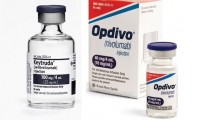-
FDA clears stereotactic guidance system from ClearPoint Neuro
- Source: drugdu
- 83
- February 6, 2024
-
Globus lays off Nuvasive employees after merger
- Source: drugdu
- 101
- January 30, 2024
-
Merck’s Keytruda extends life for kidney cancer patients after surgery, while Bristol’s Opdivo fails again
- Source: drugdu
- 98
- January 30, 2024
-
Bladder Cancer Therapies Developer Raises $380M in the First Biotech IPO of 2024
- Source: drugdu
- 89
- January 27, 2024
-
Eli Lilly Sounds Off as Early Data Show How Gene Therapy Can Restore Hearing
- Source: drugdu
- 86
- January 26, 2024
-
World’s First Perioperative Immunization Phase III Study Results in Esophageal Cancer Presented at 2024 ASCO GI
- Source: drugdu
- 86
- January 23, 2024
-
Announcement of Tasly Bioharma on the Notification of Approval of Drug Clinical Trial
- Source: drugdu
- 111
- January 22, 2024
-
Brush Biopsy Test Detects Oral Cancer without Surgery
- Source: drugdu
- 123
- January 20, 2024
-
FDA rips MiMedx with warning letter for its placental collagen wound-care treatment
- Source: drugdu
- 110
- January 15, 2024
-
Merck expects $20B+ in new cancer sales thanks to Daiichi ADC deal, Moderna vaccine
- Source: drugdu
- 100
- January 11, 2024
your submission has already been received.
OK
Subscribe
Please enter a valid Email address!
Submit
The most relevant industry news & insight will be sent to you every two weeks.













